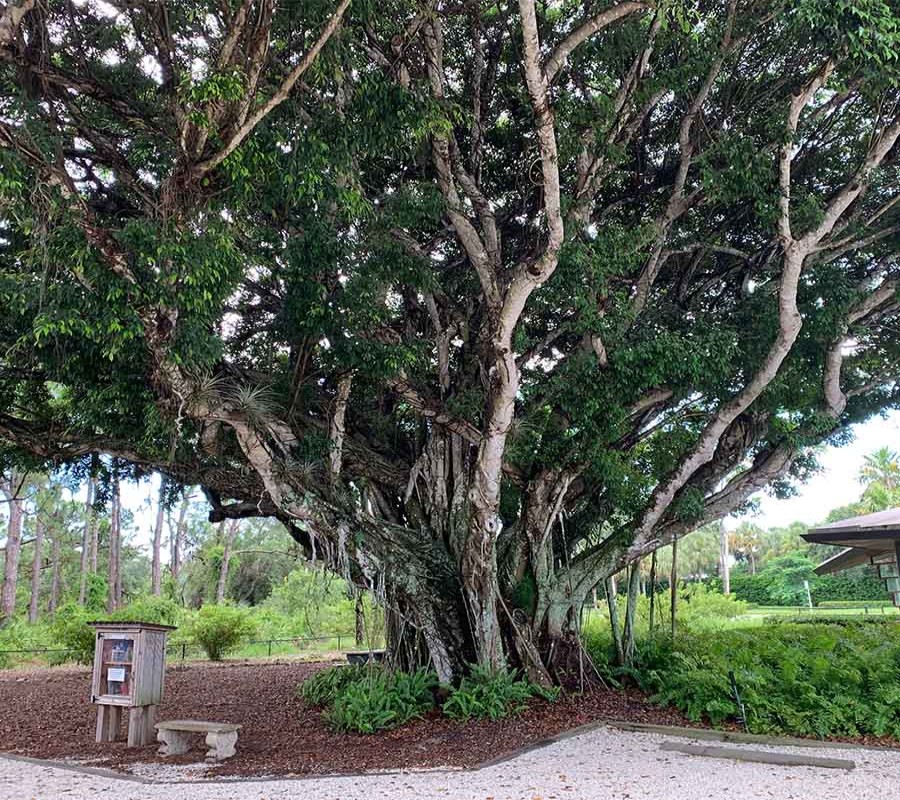Banyan Tree
The Banyan tree, scientifically known as Ficus benghalensis, stands as an iconic symbol in the valley, its broad significance extending beyond its imposing appearance. With its expansive canopy and aerial roots, the Banyan tree has been a source of shade and solace, making it an ideal place for rest, relaxation, and social interaction.
Ecological Significance:
Habitat for Wildlife: The banyan tree's vast canopy provides a haven for various birds, insects, and small animals. Its leaves and fruits offer food and shelter, contributing to a vibrant ecosystem.
Soil Conservation: The banyan tree's intricate root network helps to stabilize the soil, preventing erosion and promoting land conservation. This is particularly important in areas prone to landslides and soil degradation.
Air Purification: With its expansive leaves and efficient photosynthesis, the banyan tree plays a significant role in air purification. It absorbs carbon dioxide and releases oxygen, contributing to a healthier environment.
Medicinal Significance:
- Anti-inflammatory Properties: The leaves and bark of the banyan tree contain compounds with anti-inflammatory properties, making them potentially beneficial for treating conditions like arthritis and joint pain.
- Anti-diabetic Properties: Studies suggest that the leaves and bark of the banyan tree may aid in managing blood sugar levels, offering potential benefits for individuals with diabetes.
- Wound Healing: Traditional medicine utilizes the banyan tree's leaves and bark to promote wound healing due to their antiseptic and astringent properties.
- Other Benefits: The banyan tree is also used in traditional medicine for various ailments, including respiratory problems, digestive issues, and skin diseases. However, further research is needed to validate these claims.
References:
- "Ficus benghalensis Linn.: A review of its traditional uses, phytochemistry and pharmacology" (2014): https://www.researchgate.net/publication/332012650_Ficus_benghalensis_Linn_A_TRIBAL_MEDICINE_WITH_VAST_COMMERCIAL_POTENTIAL
- "Traditional and medicinal uses of Ficus benghalensis Linn. (Banyan tree)" (2014): https://www.researchgate.net/publication/332012650_Ficus_benghalensis_Linn_A_TRIBAL_MEDICINE_WITH_VAST_COMMERCIAL_POTENTIAL
- "Antibacterial activity of Ficus benghalensis leaves against some pathogenic bacteria" (2014): https://ijpsr.com/bft-article/antimicrobial-activity-of-leaves-of-ficus-benghalensis-against-isolated-dental-pathogens/
The banyan tree stands as a powerful symbol of life, resilience, and connection. The Banyan tree, with its majestic presence, becomes a timeless symbol of resilience, community, and the harmonious coexistence of nature and human life in the heart of the valley.
Please note: While the information provided highlights the traditional and potential medicinal uses of the banyan tree, it is important to remember that further research is needed to fully validate their efficacy and safety. Always consult with a qualified healthcare professional before using any part of the banyan tree for medicinal purposes.


